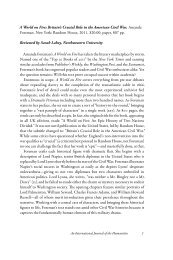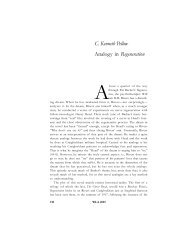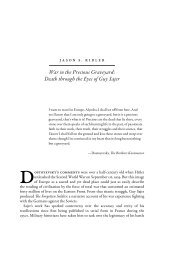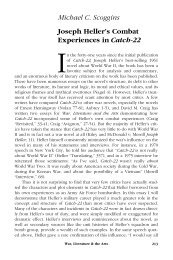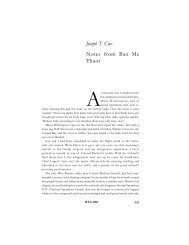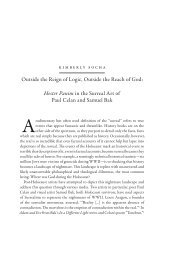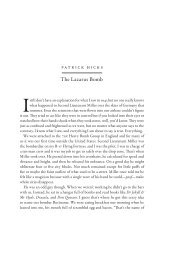Conrad's “The Secret Sharer”: A Private Ethics of Leadership
Conrad's “The Secret Sharer”: A Private Ethics of Leadership
Conrad's “The Secret Sharer”: A Private Ethics of Leadership
Create successful ePaper yourself
Turn your PDF publications into a flip-book with our unique Google optimized e-Paper software.
I took heart from the reasonable thought that the ship was like<br />
other ships, the men like other men, and that the sea was not<br />
likely to keep any special surprises expressly for my discomfiture.<br />
Arrived at that comforting conclusion, I bethought myself <strong>of</strong> a cigar<br />
and went below to get it. . . . And suddenly I rejoiced in the great security<br />
<strong>of</strong> the sea as compared with the unrest <strong>of</strong> the land, in my choice <strong>of</strong> that<br />
untempted life presenting no disquieting problems, invested with an<br />
elementary moral beauty by the absolute straightforwardness <strong>of</strong> its appeal<br />
and by the singleness <strong>of</strong> its purpose. (11)<br />
Every assumption in this little fantasy falls before the events that follow: the<br />
particular character <strong>of</strong> the ship becomes crucial to her management; the individual<br />
characters <strong>of</strong> his subordinates must be taken into account; the sea has in store a<br />
very special surprise for him. Into this false complacency Leggatt intrudes, and his<br />
arrival contradicts everything the narrator has been thinking. Suddenly the life <strong>of</strong><br />
the sea proves to be one <strong>of</strong> continual unrest, temptation, disquiet–and above all<br />
multiple in its nature, devious in its appeal, duplicitous in its purpose.<br />
When Leggatt, as the sea’s special surprise for the narrator, climbs on board the<br />
parable goes into overdrive. His name suggests an envoy or ambassador, as in a<br />
legation. He comes from the Sephora, “self-bearer” or that which gives birth to the<br />
self. Images <strong>of</strong> doubleness begin to proliferate: the “sleeping suit” that the narrator<br />
lends Leggatt fits perfectly; the narrator calls him “my double” and his own “gray<br />
ghost”; their physical similarities are pointed to: “It was, in the night, as though<br />
I had been faced by my own reflection in the depths <strong>of</strong> a somber and immense<br />
mirror,” that as they spoke they would have treated an intruder to “the uncanny<br />
sight <strong>of</strong> a double captain busy talking in whispers with his other self ” (14-18). But<br />
in what sense is Leggatt a messenger who will aid in the birth <strong>of</strong> the narrator’s<br />
selfhood? And to what degree and in what way is he his “double?”<br />
Having stressed the doubleness <strong>of</strong> the encounter and thus for the attentive reader<br />
the potential depth <strong>of</strong> the association, the narrator admits that in actual personal<br />
appearance “He was not a bit like me, really” (17). But it is not the function <strong>of</strong><br />
a double to provide a simple mirror image <strong>of</strong> the protagonist, either physically<br />
or psychologically. Doubles abound in modernist literature from Dostoevsky<br />
through Faulkner and they function chiefly to stress certain propensities <strong>of</strong> the<br />
protagonist, where he might be weak or in what moral or mental direction he<br />
might be pointed. In Crime and Punishment, which also deals with transgression<br />
and its spiritual consequences, Dostoevsky makes brilliant use <strong>of</strong> his character<br />
x War, Literature & the Arts



